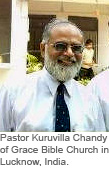 In two recent posts, The Global Church and America’s War, and Iraq and Christian Identity, I talked about the difference between the perceptions of U.S. Christians and our sisters and brothers around the world. I recently received a powerful e-mail from a Pastor Kuruvilla Chandy of Grace Bible Church, Lucknow, India, who describes himself as “a born again Christian” who supported the Cold War and “as a believer in prophecy, [is] in general agreement about supporting Israel.” Hardly the profile of a left-wing Bush-basher. I’d like to share some of what he wrote.
In two recent posts, The Global Church and America’s War, and Iraq and Christian Identity, I talked about the difference between the perceptions of U.S. Christians and our sisters and brothers around the world. I recently received a powerful e-mail from a Pastor Kuruvilla Chandy of Grace Bible Church, Lucknow, India, who describes himself as “a born again Christian” who supported the Cold War and “as a believer in prophecy, [is] in general agreement about supporting Israel.” Hardly the profile of a left-wing Bush-basher. I’d like to share some of what he wrote.
President George Bush is the darling of most born again Christians in the US of A. But in India many regard him as a liability to the Christian cause. His identification as a believer and his advocacy of the war that the rest of the world regards as unjust has embarrassed Christians who are in a minority in India.
He is not just critical of Bush, but has strong words of both challenge and encouragement for believers in the U.S.:
People will never agree on whether or not Bush is an aggressor. That really depends on political views…. Christians living in America, suffering from fear aroused by 9/11 and desiring their own self-preservation and prosperity will approve of Bush’s war against Iraq and look for ways to justify it even from a biblical viewpoint. It is heartening though to see that there are born again Christians, even in the U.S., who are opposed to the warmongering and see the war as something they have been unable to support precisely because of their faith in Christ. However the vast majority of Americans, especially those who describe themselves as born again Christians, are solidly in support of Bush, and even question the Christian identity and commitment of those who disapprove of Bush.
He further describes the connection between Bush’s faith and Bush’s war:
In effect, Bush has given Christ a bad name. As a Christian writer in India, I wrote an article arguing that Bush’s war had nothing to do with his being a born again Christian, and all to do with his being the American President (Times of India April 7, Lucknow, April 21, 2003). The only problem is that somehow his aggressive American-ness has been identified with his being a Christian. But we in India cannot see the war as the work of a Christian. In this regard, I represent the view of most Christians in India.
In my article I essentially defended born again Christianity as what is practiced by Christians who are committed to Christ and take His teachings seriously. I am myself a born again Christian. I did not deny that, just because Bush had made being a born again Christian unpopular. Being a born again Christian has nothing to do with Bush. It has all to do with following Christ faithfully with a desire to make Him known. In the Indian context it was necessary to show what born again Christianity really stood for. I had to demonstrate that being a Christian did not mean approving Bush’s war.
Perhaps even more sad than the damage Bush has done to the cause of Christ globally is the response of Christians in the U.S.:
I also circulated the article among Christian friends in the U.S., to share my concern as a Christian from a country where Christians are a minuscule minority. I shared it with my friends in America trying to somehow influence Christian opinion in the U.S. Suddenly I lost friends—not just Americans, even Indians settled in the U.S.
As I reflected on my loss of some of my Christian friends living in America, I sadly noted the great divide that has occurred among Evangelical Christians. I know that Evangelicalism is not White Christianity, but somehow I get the impression that the agenda of White Evangelical Christianity is being thrust on Evangelicals around the world. It would seem that if one is to be accepted as a born again Christian, then one is required to approve of the world’s only born again Christian statesman. If you don’t approve of Bush, you’re not okay.
Most American Christians have put their faith in Bush imagining that he will ensure their safety. If anything, he has made the world more unsafe for Americans and even for those who side with Americans.
Will Christians in the U.S. hear the prophetic challenge from their global sisters and brothers? Or, like the friends Pastor Chandy has lost, will they value their political allegiances above their allegiance to Christ, and to his body in the worldwide church?
